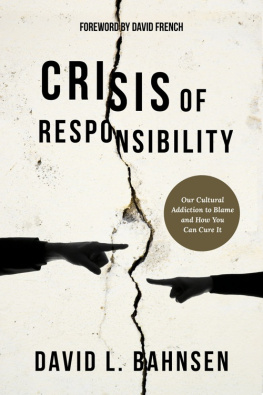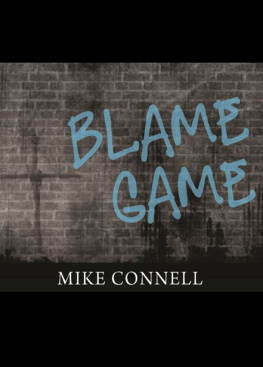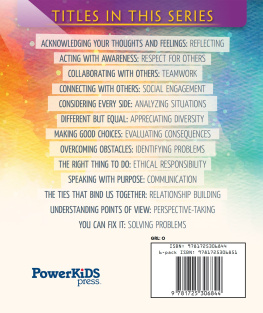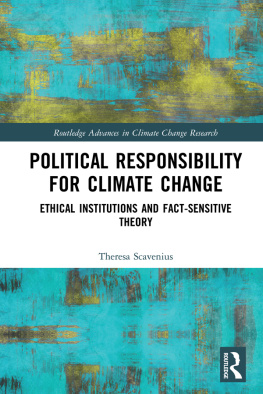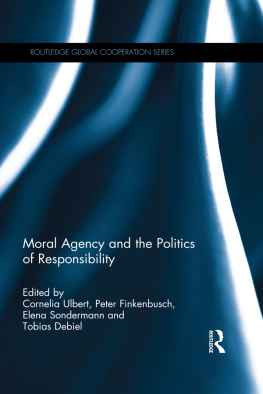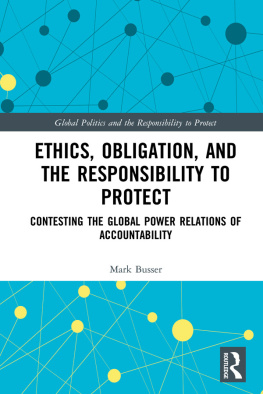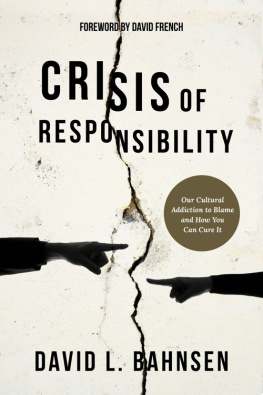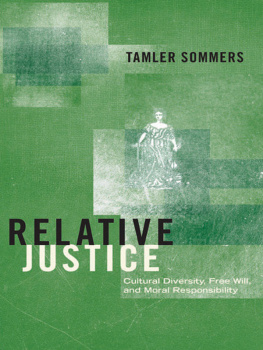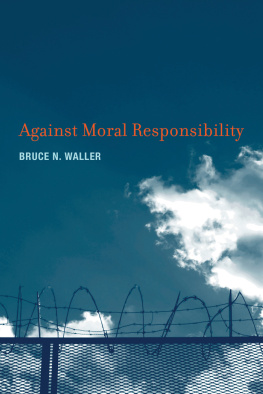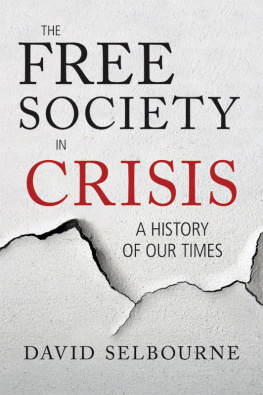CRISIS OF RESPONSIBILITY
DISINTEGRATING RESPONSIBILITY
The Social Foreshadowing
to the Present Crisis
To suppose that any form of government will secure liberty or happiness without any virtue in the people is a chimerical idea.
JAMES MADISON
I f 2016 was the year politics revealed the percolating cultural tensions of a new global economy, then perhaps 2012 was the year that those who believe culture is upstream from politics knew it was coming.
Charles Murrays landmark book, Coming Apart: The State of White America, 19602010 , was released in 2012 to much deserved acclaim. A political scientist and sociologist with a doctorate from MIT and an undergraduate degree from Harvard University, Dr. Murray examined changes in American culture in the generation that had matured since the 1960s. He purposely isolated his analysis only to sociological data of white America, so as to avoid any accusation of racial bias or affectation. The study provided empirical data and thoughtful conclusions that were powerful and profoundly important for those seeking to better understand an increasingly divided culture.
The cultural context Murray described became the raw material for the political transformation of 2016. He portrayed a deeply divided and polarized white America at risk of coming apart further if the root cultural issues were unaddressed. Political commentary in 2016 often described the forces Trump tapped into as novel or new, but in reality, 2016 was more about politics catching up to culture. The forces of frustration had been stirring beneath the surface for quite some time.
As with many of the issues well examine, the consensus diagnosis that Main Street was rightly frustrated for having been victimized by some other impersonal force or societal institution doesnt completely line up with reality. The narrative many on the Right prefer is an easy one to grasp: America is a God-fearing nation filled with men and women of industry, family, and faith. The leftist forces of redistributionism, statism, humanism, and elitism have distorted, if not ruined, the righteous efforts of this core American nucleus.
I find this narrative easy to believe for it facilitates two ideas that are easier to accept than the actual truth of the matter: (1) at its core, Americana remains industrious, virtuous, and engaged; and (2) the bad guy is some chosen -ism closely correlated with elitism (secular academia, biased media, a liberal political establishment, and so on). In this story, hope is always right around the corner, for all we need do is to vanquish the leftism polluting the goodness of the American psyche and the righteous, industrious class will eagerly usher in the city on a hill. As this story goes, the free and virtuous society is hindered, not by the rank and file but by the culturally leftist elites who have thoroughly poisoned our institutions.
This narrative of American life is at the heart of the commercial success of conservative talk radio and many of the different expressions of right-wing media (internet, social media, cable news, and so forth). It has a clear protagonistmillions of American men and women who simply want to love God and country and take responsibility for their own economic well-being. It has a clear antagonistleftists opposed to Americas foundations who seek to reshape our country into a secular, humanistic, European welfare state.
The Unraveling of Virtue
Lets start with the parts of this narrative that are painfully true, if only incompletely so. There are elitist forces within education, the media, and the government who disdain the principles undergirding the American experiment. This fact is as obvious in modern America as any sociopolitical truism could be. For many on the Right, the efforts of the cultural Left to suppress religious liberty, to invite humanism into all aspects of the pop culture, and to redefine the story of America is a form of civil war. Indeed, this author is the first to acknowledge that the nation we wish to preserve must be protected from the immoral and anti-intellectual parasites that live off Americas cultural heritage while, at the same time, trying to disconnect her from that heritage in which she can best thrive.
These leftist threats to the American project are real and often concentrated in bicoastal capitals of snobbery and anti-Western sentiment. Any comprehensive audit of the institutional forces in our society would reinforce the belief by those on the Right that elitists are actively trying to change how we live and think.
But believing that there are external forces (external to the core American nucleus of working-class folks who value God and country) accelerating our cultural and even economic demise is not the same as agreeing that those forces are the primary cause. Indeed, as Murrays book so ardently demonstrated, the cultural deterioration we see today started when the social fabric of what was once a virtuous working class began to unravel. The true story of our coming apart is this: rather than being the result of globalization and other contemporary challenges, the unraveling of virtue within the working class is actually the root cause of our inability to properly respond .
Murray uses the following four categories, or founding virtues as he calls them, to illustrate the divide between those in the higher social and economic strata of American life and those in the middle and lower segments: industriousness, honesty, marriage, and religion. Murray demonstrates using carefully analyzed data that divorce rates have come down in more affluent cities and counties. Out-of-wedlock births are also extremely rare in those places. A happy marriage, as can best be demonstrated by data from self-reporting assessments, is a more prized commodity in those communities perceived as thriving economically. These communities are often vilified as being the winners or inside players in the present global economic transformation.
The view of virtue in blue-collar America isnt quite as rosy. Marriage often creates and protects economic stability. Its a nearly indisputable fact. Thats whats so troubling about the basic decline in the percentage of people who are married or ever have been married in our society. While over 85 percent of thirty- to forty-nine-year-old males in upper-class America are married, that number has plummeted in middle Americafrom 85 percent one generation ago to below 50 percent today. As the chart below demonstrates (Fig. 3.1), the total percentage of married adult men has dropped from 70 percent in 1960 to only 50 percent in 2016. The percentage of never-married men has risen from 25 percent to nearly 40 percent.
All the data reinforces a basic theme: the cultural fibers in middle America havent merely weakened over the last forty yearsthey have unraveled. And in nearly every case, the delta between the upper class and middle class hasnt just expanded, its been blown out. Unmarried men living at their parents homes, birth rates, divorce rates, marriage ratesin every category over the last forty years, the statistics have worsened for white middle-class and lower-class America and have largely remained unchanged or improved for upper-class America. Today, only 46 percent of American children live with both birth parents, down from 61 percent in 1980 and 73 percent in 1960.
Figure 3.1
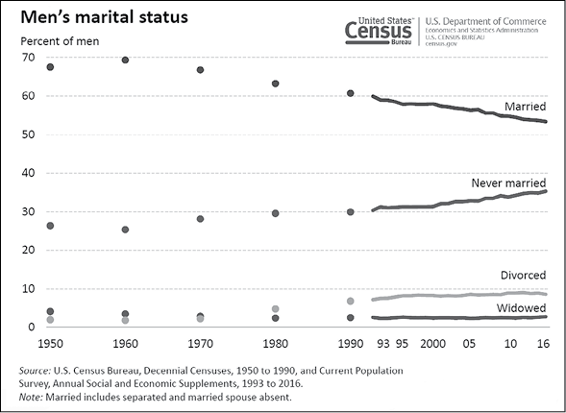
Figure 3.2
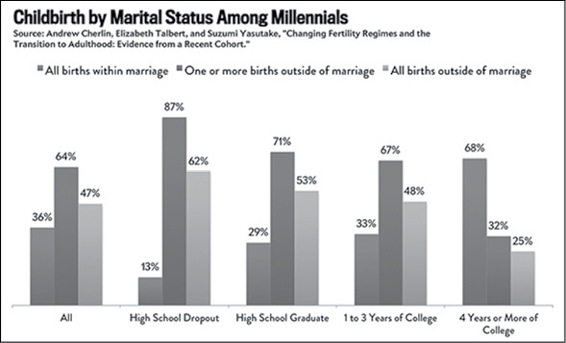
Figure 3.3
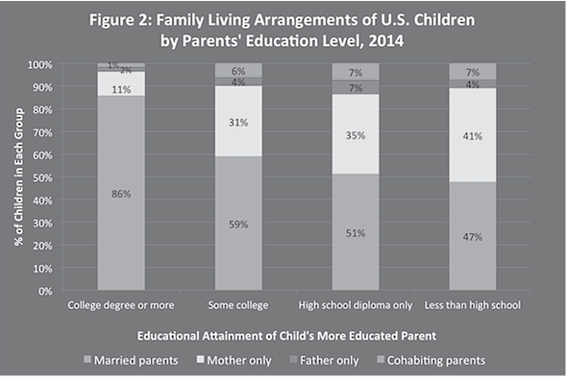
Next page
